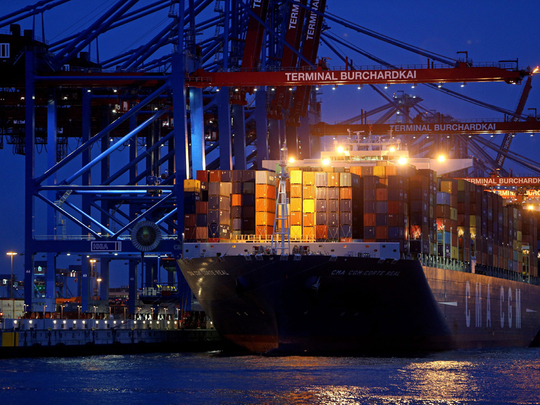
Frankfurt: The German economy, Europe’s biggest, stalled in the second quarter, hit by weak exports and falling investment, data showed Thursday, casting a cloud over recovery in the crisis-battered region.
According to a flash estimate by the federal statistics office Destatis, Germany’s gross domestic product (GDP) shrank by 0.2 per cent in the period from April to June, following growth of 0.7 per cent in the preceding three months.
Analysts had been forecasting zero growth or even a minimal contraction in the second quarter after the unusually mild winter boosted activity in the first three months of the year, notably in areas such as construction.
Thanks to the mild weather, construction investment that would normally have been made later in the year was brought forward.
Exports were also weak, not climbing as strongly as imports, with the result that the net contribution of foreign trade to GDP growth was negative in the second quarter, Destatis said.
On the positive side, both private household and public sector spending increased, the statisticians noted.
Using a 12-month comparison, the German economy lost steam in the April-June period, with GDP expanding by 0.8 percent compared with a year earlier, Destatis said.
The statistics office said it would publish a more detailed breakdown of the second-quarter growth figures on September 1.
Despite the economic contraction, analysts insisted that the recovery trend was not in jeopardy.
Temporary blip
“The second-quarter setback reflects a combination of technical factors and external weakness, but not fundamental problems in the economy,” said Berenberg Bank economist Christian Schulz.
“A relatively mild winter triggered a shallower than usual spring rebound in construction activity, while the timing of Easter holidays may have also shifted some production from the second quarter to the first quarter,” he said.
“Put simply, the first-quarter figure probably overstated underlying growth a bit, while the second-quarter decline understates it.”
Recent confidence surveys suggest that the crisis in Ukraine has made German companies more cautious about their investment plans, but the impact of tit-for-tat economic sanctions is likely to have been limited so far, analysts said.
Berenberg Bank’s Schulz said that “with a very strong labour market, rising wages and low inflation, the fundamental outlook for consumers is very positive.”
And the underlying domestic strength suggested that Germany should resume growth soon, the expert said.
“In the short term, the escalation of the conflict in eastern Ukraine is likely to lead to a further serious deterioration in confidence surveys and economic data. But Germany should rebound quickly once the conflict fades from the headlines and should resume its role as engine of Eurozone growth,” he said.
In Berlin, economic think-tank DIW said falling investment was attributable to the current “geopolitical crises”.
With weak industrial orders expected in the third quarter, “it is possible that the German economy could slip into a shallow recession,” said DIW economist Ferdinand Fichtner.
“But as long as the crisis remains under control and the Eurozone economy gradually recovers, the German economy should find its way back to a moderate recovery,” he said.












